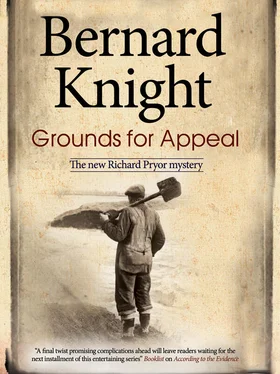Bernard Knight - Grounds for Appeal
Здесь есть возможность читать онлайн «Bernard Knight - Grounds for Appeal» весь текст электронной книги совершенно бесплатно (целиком полную версию без сокращений). В некоторых случаях можно слушать аудио, скачать через торрент в формате fb2 и присутствует краткое содержание. Жанр: Классический детектив, на английском языке. Описание произведения, (предисловие) а так же отзывы посетителей доступны на портале библиотеки ЛибКат.
- Название:Grounds for Appeal
- Автор:
- Жанр:
- Год:неизвестен
- ISBN:нет данных
- Рейтинг книги:4 / 5. Голосов: 1
-
Избранное:Добавить в избранное
- Отзывы:
-
Ваша оценка:
- 80
- 1
- 2
- 3
- 4
- 5
Grounds for Appeal: краткое содержание, описание и аннотация
Предлагаем к чтению аннотацию, описание, краткое содержание или предисловие (зависит от того, что написал сам автор книги «Grounds for Appeal»). Если вы не нашли необходимую информацию о книге — напишите в комментариях, мы постараемся отыскать её.
Grounds for Appeal — читать онлайн бесплатно полную книгу (весь текст) целиком
Ниже представлен текст книги, разбитый по страницам. Система сохранения места последней прочитанной страницы, позволяет с удобством читать онлайн бесплатно книгу «Grounds for Appeal», без необходимости каждый раз заново искать на чём Вы остановились. Поставьте закладку, и сможете в любой момент перейти на страницу, на которой закончили чтение.
Интервал:
Закладка:
Richard hauled his black bag out of the Humber’s boot and made his way back to the entrance of the court. Here a coroner’s officer showed him into a waiting room where DI Thomas from Cardiganshire was standing with several other plain-clothes officers from Birmingham.
Meirion Thomas introduced him to the Winson Green detectives, Trevor Hartnell and Tom Rickman. They brought him up to date with the finding of the head and the meagre information they had prised from the former publican of the Barley Mow.
‘We’re seeing another villain later this afternoon,’ explained Hartnell. ‘He’s banged up in prison, but we hope he can tell us a bit more, possibly even give us an identity.’
After a little more chat, the coroner’s officer, a middle-aged constable whose developing arthritis made him unfit to pound a beat, asked Richard if he would have a word with the coroner. He took him through into an inner sanctum, where he met Doctor Theobald Priestly, a dapper man in his fifties, who had qualified as a barrister at Lincoln’s Inn some years after becoming a medical practitioner. Richard knew that in some of the larger cities, such as London and Birmingham, doubly qualified men were preferred as coroners.
Doctor Priestly had greying ginger hair with a matching Van Dyke beard and Richard felt that with a lace collar and a rapier on his belt, he could have walked straight out of a Restoration portrait. He came around his desk and shook hands, motioning his visitor to a chair.
‘Damned odd affair this, doctor!’ he remarked, in what Richard’s mother would call a cut-glass accent. ‘Two coroners each with part of a body in two different countries!’
‘Well, we’re not yet sure that they are parts of the same body, but I’ll do my best to find out,’ replied Richard. ‘If it seems likely, which way will the parts go?’
The coroner gave his beard a brief massage.
‘I’ll have to discuss this with my counterpart at your end, but if what our CID fellows suggest may be true, then the cause of his death sounds as if it’s more a matter for this city than Aberystwyth. No hope of deciding where he died, I suppose?’
Richard shook his head. ‘I don’t see how that could be established, given the length of time that’s elapsed. With no known scene of death to examine, it seems impossible, unless some solid new evidence comes to light. But that’s a matter for the police, rather than me.’
A few minutes of chat established that they had several mutual acquaintances in the Royal Army Medical Corps, as Doctor Priestly had spent most of the war in a Field Ambulance, ending up commanding one in the Italian campaign. When Richard left his office, he felt pleased with this new contact, as the coroner had promised to keep him in mind whenever he need someone to stand in for one of his regular pathologists.
Outside, the coroner’s officer led him and the detectives down a passage and out into the body store of the mortuary, a busy place with a large throughput of bodies from the central part of the huge city. The outer area was where the hearses and plain vans loaded and unloaded coffins into a hall lined on one side by a bank of refrigerators. Beyond this was the mortuary assistants’ office, which housed the registers and the inevitable electric kettle and tray of chipped mugs and cups.
An amiable senior technician welcomed them and promised tea and biscuits as soon as they had finished.
‘A bit out of the usual run of “pee-ems”, doctor!’ he observed. ‘A body in a bucket, almost! I thought we could do the necessary on one of the tables, if that suits you.’
They trooped into the main post-mortem room, a large, bare chamber with a partial glass roof and half a dozen porcelain autopsy tables in a row down the centre. Waiting there was a police photographer with a large camera and flashgun.
Three of the slabs had corpses on them, one being in the process of being sewn up and made presentable by another mortuary attendant. On one of the empty tables stood a metal container with a police exhibits label tied to its handle with string. The photographer began by taking a few shots of it, the flashes from the bulbs illuminating the whole room.
‘What do you need, doctor?’ asked the senior technician solicitously. ‘Will just an apron and gloves do, or do you want a gown as well?
Richard settled for a green rubber apron and some rubber gloves and approached the table with the canister. Close behind came the two CID men, Trevor Hartnell already lighting up a cigarette. ‘Can’t stand the stink in these places,’ he said apologetically. ‘Blood and Lysol, I reckon!’
His detective sergeant seemed immune to smells and stood impassively on the opposite side of the white table, still wearing his belted mackintosh and wide-brimmed trilby.
‘Right, sir, I’d better identify this properly to you.’ Hartnell, who wore a heavy grey overcoat, tapped the label on the handle. ‘This is the container we recovered yesterday from a shed at 183 Markby Road, Handsworth. It’s been dusted for prints, not that I think that will help after it’s been knocking about for all these years.’
Richard took a stainless-steel T-bar from the assortment of mortuary tools left on the table. This was like a short, wide screwdriver with a crossbar, used for levering off skullcaps after they had been sawn through. He used it now to pop off the lid, which he laid to one side, allowing a pungent aroma to arise from the interior of the drum.
‘That’s mainly methylated spirit, by its smell,’ he remarked. Peering inside, he saw strands of hair floating under the surface, but resisted the temptation to use them to lift out the head, in case they detached from the scalp. Sliding both gloved hands down the sides, he carefully hoisted it out and laid it on the table.
The head was covered in shrivelled skin of a pale greyish colour, with a wizened caricature of a face. It seemed to have collapsed in on itself, the cheeks hollow and the eyelids lying back in sunken sockets. There was no sign of decomposition and the hair, which was still black, lay in wisps across the scalp. The lips had contracted back in a bizarre grin, showing irregular teeth in grey gums.
Richard stood back to allow the photographer to take a series of pictures from various angles.
‘Why the pale colour, Doc?’ asked Tom Rickman, who seemed unmoved by the gruesome object.
‘Alcohol fixes the tissue like that, making them hard, not like formaldehyde. It used to be used for preserving specimens many years ago and some of the pots in old medical museums are full of it.’
‘The head has lasted well, if it really is ten or more years old,’ observed Hartnell.
The pathologist agreed. ‘It also tells us that the head was put into preservative quite soon after death, as there’s no sign at all of decomposition.’
‘How soon, doctor?’
‘Depends on the environment and even the season. A head will last much better than the belly, but in cold weather like this December, it would keep fresh for a week at least, but left in a warm house or during hot summer weather, a couple of days would see it going off quickly.’
The two detectives peered intently at the face.
‘I haven’t been around our manor for very long, so I wouldn’t expect to recognize him, even if that horrible face was in better shape,’ said the inspector. ‘What about you, Tom? You’ve been in Winson Green for a long time.’
The sergeant leaned closer, then shook his head. ‘Doesn’t ring a bell with me. But I doubt his own mother would recognize him, all shrivelled like that.’
Richard got to work, taking the head in his hands and studying it closely from every angle. He lifted the stiff eyelids and saw the globes inside had collapsed completely. The jaw was immobile, due to the fixation of the muscles by the alcohol, but he could see almost a full set of teeth, even though some were chipped and discoloured.
Читать дальшеИнтервал:
Закладка:
Похожие книги на «Grounds for Appeal»
Представляем Вашему вниманию похожие книги на «Grounds for Appeal» списком для выбора. Мы отобрали схожую по названию и смыслу литературу в надежде предоставить читателям больше вариантов отыскать новые, интересные, ещё непрочитанные произведения.
Обсуждение, отзывы о книге «Grounds for Appeal» и просто собственные мнения читателей. Оставьте ваши комментарии, напишите, что Вы думаете о произведении, его смысле или главных героях. Укажите что конкретно понравилось, а что нет, и почему Вы так считаете.












